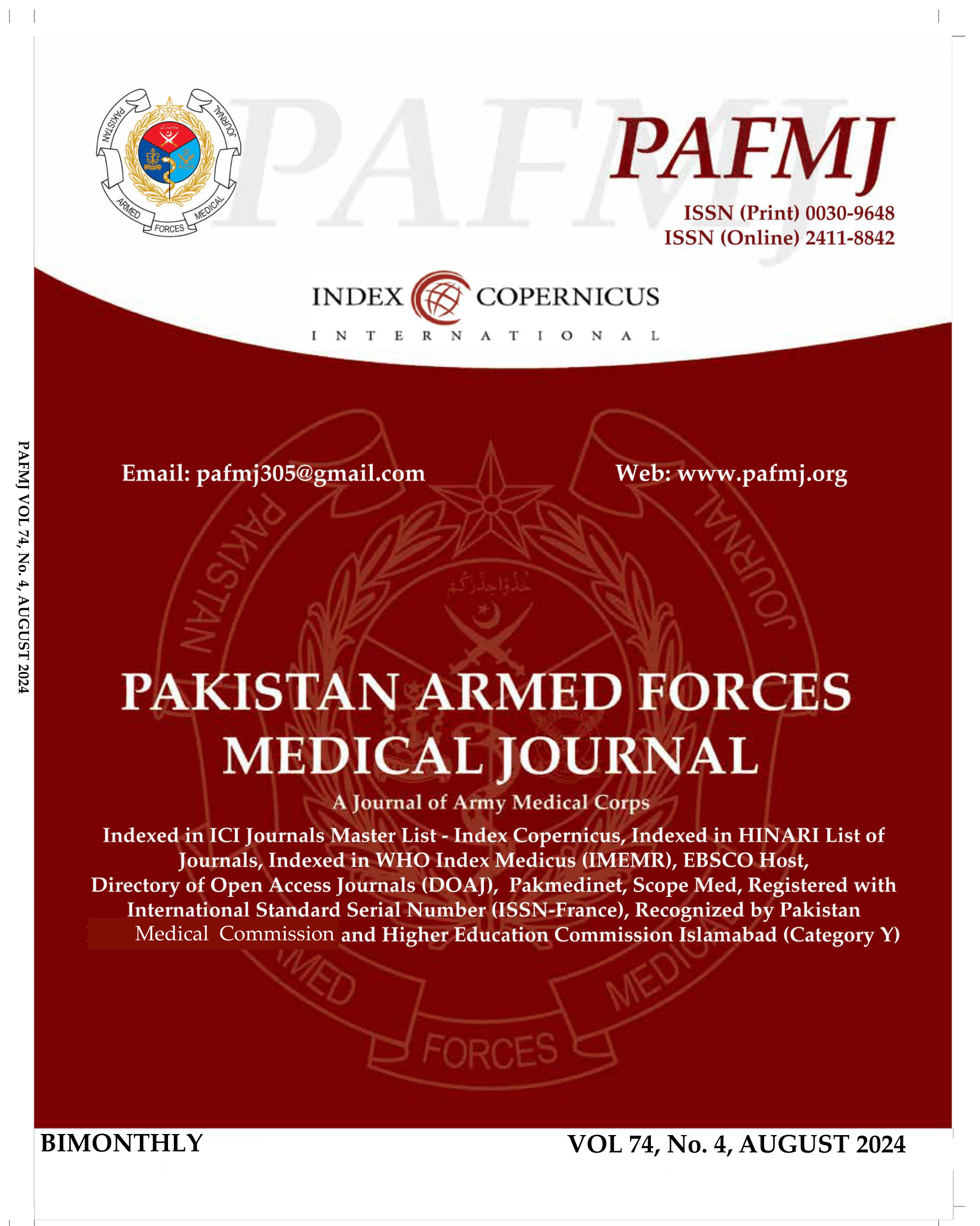Effect of Alprazolam Versus Pregabalin on Sleep Quality in Patients of Chronic Kidney Disease
DOI:
https://doi.org/10.51253/pafmj.v74i4.8860Keywords:
Chronic kidney disease, Hemodialysis, Sleep quality.Abstract
Objective: To assess sleep quality in patients of Chronic Kidney Disease using Pittsburgh Sleep Quality Index score and to compare the effects of Alprazolam and Pregabalin in patients having poor sleep quality.
Study Design: Quasi-experimental study.
Place and Duration of Study: Nephrology Department of Combined Military Hospital, Karachi Pakistan, from Oct 2021 to Mar 2022.
Methodology: A total of 127 individuals coming to Nephrology Department diagnosed with chronic kidney disease were included. Sleep quality was assessed using Pittsburgh Sleep Quality Index score. Age, gender, duration of Chronic Kidney Disease and history of Diabetes, Hypertension and Cardiovascular disease were recorded. Those individuals having poor sleep quality were started randomly on either Alprazolam 0.5 mg and Pregabalin 75 mg daily. Effects of these drugs were assessed by determining Pittsburgh Sleep Quality Index two months after administration of these drugs.
Results: Out of 127 individuals, 82(64.5%) had poor quality sleep characterized by Pittsburgh Sleep Quality Index ≥5 at the time of presentation. Among them, 40(48.7%) were male and 42(51.3%) were female, 46(56.1%) had history of Diabetes Mellitus, 48(58.5%) had history of Hypertension and 31(37.8%) had history of Cardiovascular disease. Forty-one were started on Alprazolam and 41 on Pregabalin. No statistically significant difference was found in the sleep quality between groups at the end of two months of regular treatment (p-value =0.088).
Conclusion: Sleep disturbances are present in majority of the patients of Chronic Kidney Disease. Both Alprazolam and Pregabalin can be used to treat sleep related disorders in these patients.
Downloads
References
El-Baroudy N, El Falaki M, Hagras A, Galal R, Azmy R, El-Sayed B, et al. Sleep disorders in children and adolescents on regular hemodialysis. Eur J Pediatr 2020; 179(7): 1139–1146.
https://doi.org/10.1007/s00431-020-03611-w
Kim D, Pollock C. Epidemiology and burden of chronic kidney disease-associated pruritus. Clin Kidney J 2021; 14(Suppl 3): 1–7.
https://doi.org/10.1093/ckj/sfab142
Empitu MA, Kadariswantiningsih IN, Thaha M, Nugroho CW, Putri EAC, Hakim ZE, et al. Determiner of poor sleep quality in chronic kidney disease patients links to elevated diastolic blood pressure, hs-CRP, and blood-count-based inflammatory predictors. Indones Biomed J 2019; 11(1): 100–106.
Cardoso MP, Pereira LAL. Native vitamin D in pre-dialysis chronic kidney disease. Nefrologia 2019; 39(1): 18-28.
https://doi.org/10.1016/j.nefroe.2018.07.007
Pojatić Đ, Pezerović D, Mihaljević D, Degmečić D. Factors associated with sleep disorders in patients on chronic hemodialysis treatment. Southeast Eur Med J 2020 4(1): 74–86.
https://doi.org/10.26332/seemedj.v4i1.123
Hejazian SM, Ahmadian E, Zununi S, Faraji L, Farnood F. The association of sleep quality and vitamin D levels in hemodialysis patients. Biomed Res Int 2021; 2021: 4612091.
https://doi.org/10.1155/2021/4612091
Zhang J, Wang C, Gong W, Peng H, Tang Y, Li CC, et al. Association between sleep quality and cardiovascular damage in pre-dialysis patients with chronic kidney disease. BMC Nephrol 2014; 15(1): 1-9. https://doi.org/10.1186/1471-2369-15-131
Ricardo AC, Knutson K, Chen J, Appel LJ, Bazzano L, Carmona-Powell E, et al. The association of sleep duration and quality with CKD progression. J Am Soc Nephrol 2017; 28(12): 3708–3715. https://doi.org/10.1681/ASN.2016121288
Theodorou V, Karetsi E, Daniil Z, Gourgoulianis KI, Stavrou VT. Physical activity and quality of sleep in patients with end-stage renal disease on hemodialysis: A preliminary report. Sleep Disord 2020; 2020: 1–5. https://doi.org/10.1155/2020/6918216
Zubair UB, Butt B. Assessment of quality of sleep and its relationship with psychiatric morbidity and Socio-demographic factors in the patients of chronic renal disease undergoing hemodialysis. J Coll Physicians Surg Pak 2017; 27(7): 427–431.
Shafi ST, Shafi T. A comparison of quality of sleep between patients with chronic kidney disease not on hemodialysis and end-stage renal disease on hemodialysis in a developing country. Renal Fail 2017; 39(1): 623–628.
https://doi.org/10.1080/0886022X.2017.1361836
Grandner MA, Kripke DF, Yoon I-Y, Youngstedt SD. Criterion validity of the Pittsburgh Sleep Quality Index: Investigation in a non-clinical sample. Sleep Biol Rhythms 2006; 4(2): 129–139.
https://doi.org/10.1111/j.1479-8425.2006.00207.x
Nigam G, Camacho M, Chang E, Riaz M. Exploring sleep disorders in patients with chronic kidney disease. Nat Sci Sleep 2018; 10: 35–43. https://doi.org/10.2147/NSS.S125839
Maung SC, El Sara A, Chapman C, Cohen D, Cukor D. Sleep disorders and chronic kidney disease. World J Nephrol 2016; 5(3): 224–232. https://doi.org/10.5527/wjn.v5.i3.224
Mujahid M, Nasir K, Qureshi R, Dhrolia M, Ahmad A. Comparison of the quality of sleep in patients with chronic kidney disease and end-stage renal disease. Cureus 2022; 14(4): e23862. https://doi.org/10.7759/cureus.23862
Lao XQ, Liu X, Deng H-B, Chan T-C, Ho KF, Wang F, et al. Sleep quality, sleep duration, and the risk of coronary heart disease: A prospective cohort study with 60,586 adults. J Clin Sleep Med 2018; 14(1): 109–117.
https://doi.org/10.5664/jcsm.6894
Choi Y, Choi JW. Association of sleep disturbance with risk of cardiovascular disease and all-cause mortality in patients with new-onset type 2 diabetes: data from the Korean NHIS-HEALS. Cardiovasc Diabetol 2020; 19(1): 61.
https://doi.org/10.1186/s12933-020-01032-5
Wang J, Wang Z, Wang X, Du G, Zheng B, Li Y, et al. Combination of alprazolam and Bailemian capsule improves the sleep quality in patients with post-stroke insomnia: A retrospective study. Front Psychiatry 2019; 10: 411.
Downloads
Published
Issue
Section
License
Copyright (c) 2024 Khurram Mansoor, Hafiz Waleed Khan, Ummarah Zafar Farid, Muhammad Irfan Khattak, Muhammad Zeeshan Akram, Ghulam Rasool Maken

This work is licensed under a Creative Commons Attribution-NonCommercial 4.0 International License.















